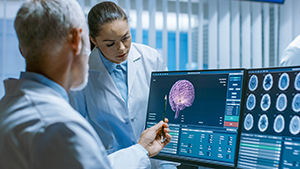For Researchers

The Human Brain Collection Core (HBCC) obtains brains from deceased individuals with and without mental illnesses and makes those samples available to researchers around the world. If you’re interested in requesting a sample, visit the Make a Request page to learn more.
Sources of donated brains
The Office of the Chief Medical Examiner (OCME) of the Central and Northern Districts in Virginia notify HBCC of potential donors.
HBCC contacts the primary next-of-kin of the decedent to obtain consent for donation of the entire brain and a blood sample. Our staff audio record the next-of-kin’s consent as an official record of the donation. Only after obtaining permission, we arrange with the OCME to collect the donated brain.
We remove identifying information from any materials we receive to protect the confidentiality of the decedent.
When possible, we obtain further information about the decedent’s medical and psychiatric history through interviews with the family and released medical records after obtaining written authorization from the next-of-kin.
All our procedures are approved by the HBCC Oversight Committee and by the NIH Department of Bioethics.
Tissue processing
Each brain is sliced into 0.5 cm slabs using a plastic mold to assure symmetry and consistency between the slices and brains. The slabs are flash frozen in a slurry of isopentane and dry ice within a short period of time upon arrival in our lab. Some tissue portions are dissected from the brain before freezing and either frozen separately (e.g. midbrain) or placed in formalin for neuropathological examination (e.g., assessment of neurodegenerative disorders).
The slabs are barcoded and stored in individual vacuum sealed bags in -80°C freezers until dissections of circumscribed brain regions are performed for individual projects. Dissections are performed using a dental drill or a scalpel. Tissue is either stored in small blocks or pulverized and aliquoted without thawing at any time during the procedure.
Whole blood is sent to the National Medical Services lab for routine or custom toxicological analysis, depending on the subject’s medical history. The remaining blood is stored for research purposes in -80°C freezers.
Research projects
Most of the research projects are performed as collaborations with intramural and extramural researchers, and some are performed within HBCC.
The HBCC receives an average of 50 requests per year for samples for individual projects; approximately half of these come from researchers at institutions outside NIH, and half come internally from NIH institutes. We distribute more than 1,000 samples annually in fulfillment of these requests.
HBCC also distributes the data obtained by RNA, DNA and CHIP sequencing, genotyping, gene expression microarrays, and quantitative PCR directly to approved investigators or through NIH-approved websites:
- Human Brain Collection Core genomics data in post-mortem brain of psychiatric disorders #3151 (available on the NIMH Data Archive (NDA) )
- The database of Genotypes and Phenotypes (dbGaP), Study ID phs000979.v3.p2
The HBCC also contributed tissues to the CommonMind Consortium , the Psychencode Consortium , and other projects .
Resources
Currently, the HBCC resources include brain tissues (varying brain regions and amounts available) from individuals with the following diagnoses (numbers of individuals in parenthesis):
- Attention Deficit Hyperactivity Disorder (22)
- Anxiety Disorders (27)
- Autism Spectrum Disorder (5)
- Bipolar Disorder (160)
- Unspecified Depressive Disorder (35)
- Eating Disorders (3)
- HIV positive Cases (3)
- Major Depressive Disorder (283)
- Obsessive Compulsive Disorder (15)
- Unspecified Psychosis (3)
- Post-traumatic Syndrome Disorder (17)
- Schizophrenia (193)
- Substance Use Disorder (135)
- SARS-CoV-2 (8)
We also have available:
- Non-psychiatric Cases (Controls) (344)
Cases with various neurological disorders (<40), including but not limited to Parkinson’s disease, Alzheimer’s disease, Multiple Sclerosis, progressive multifocal leukoencephalopathy, and hypoxic-ischemic injury. Note that many cases with neurodegenerative disease do not have formal staging.
All our inventory can be searched on the NeuroBioBank portal . Once you have a list of cases you want to request, please follow the instructions on the HBCC Make a Request page. Our request process is distinct from the NeuroBioBank process. You can also elect to let us choose samples for you by specifying the composition and exclusion/inclusion criteria of the groups for your study.
Other resources include:
- cDNA libraries constructed from dorsolateral prefrontal cortex (DLPFC), hippocampus, anterior cingulate cortex (ACC) and subgenual cingulate cortex (sgACC), and dura from hundreds of subjects with mental disorders and controls
- frozen sections (14 um thick) mounted on slides (DLPFC from 32 patients with schizophrenia and 63 controls),
- formalin-fixed coronal slices (approximately 15 mm thick) of a single hemisphere from 15 controls, 10 patients with schizophrenia, 5 with major depression, 4 with bipolar disorder.
Having trouble finding what you’re looking for?
If you cannot find what you are looking for in our bank, please try the NIH NeuroBioBank. The NIH-funded NeuroBioBank (NBB) was established in September 2013 as a national resource for investigators utilizing human post-mortem brain tissue and related biospecimens for their research to understand conditions of the nervous system.

